European Research Academy on
Alzheimer’s Disease
Bertinoro, Italy • 1-5 March 2026

European Research Academy on
Alzheimer’s Disease
Bertinoro, Italy • 1-5 March 2026

European Research Academy on
Alzheimer’s Disease
Bertinoro, Italy • 1-5 March 2026

 Luc Buée, CNRS Research Director, leads the Lille Neuroscience & Cognition Research Centre at the University of Lille, France. His Inserm laboratory, based at the Lille University Hospital, focuses on Alzheimer’s disease and related disorders.
Luc Buée, CNRS Research Director, leads the Lille Neuroscience & Cognition Research Centre at the University of Lille, France. His Inserm laboratory, based at the Lille University Hospital, focuses on Alzheimer’s disease and related disorders.
Since 1989, Buée has pioneered research on proteins linked to Alzheimer’s. During his PhD at Mount Sinai Medical Center (New York), he studied proteoglycans in Alzheimer’s and made key observations on microvasculature abnormalities in neurodegeneration. He then contributed to the early biochemical characterization of tau aggregates in tauopathies and developed experimental models to investigate post-translational modifications in tau aggregation and secretion—models now widely used for testing therapeutic strategies (biotherapies, small molecules, non-drug approaches).
His team has uncovered numerous non-microtubular functions of tau and currently explores the pathophysiological effects of tau aggregation, its interplay with amyloid pathology, and inflammation in Alzheimer’s.
Buée serves on scientific advisory boards and committees, organizes the Eurotau meetings, and has received multiple awards for his research. He is also a foreign member of the Royal Academy of Medicine of Belgium.
 Luc Buée, CNRS Research Director, leads the Lille Neuroscience & Cognition Research Centre at the University of Lille, France. His Inserm laboratory, based at the Lille University Hospital, focuses on Alzheimer’s disease and related disorders.
Luc Buée, CNRS Research Director, leads the Lille Neuroscience & Cognition Research Centre at the University of Lille, France. His Inserm laboratory, based at the Lille University Hospital, focuses on Alzheimer’s disease and related disorders.
Since 1989, Buée has pioneered research on proteins linked to Alzheimer’s. During his PhD at Mount Sinai Medical Center (New York), he studied proteoglycans in Alzheimer’s and made key observations on microvasculature abnormalities in neurodegeneration. He then contributed to the early biochemical characterization of tau aggregates in tauopathies and developed experimental models to investigate post-translational modifications in tau aggregation and secretion—models now widely used for testing therapeutic strategies (biotherapies, small molecules, non-drug approaches).
His team has uncovered numerous non-microtubular functions of tau and currently explores the pathophysiological effects of tau aggregation, its interplay with amyloid pathology, and inflammation in Alzheimer’s.
Buée serves on scientific advisory boards and committees, organizes the Eurotau meetings, and has received multiple awards for his research. He is also a foreign member of the Royal Academy of Medicine of Belgium.
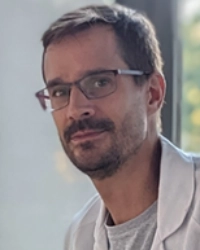 Gaël Nicolas is a neurogeneticist (MD in Neurology and PhD in Genetics) working as a professor and medical practitioner in neurogenetics in the University Hospital of Rouen (France) and the University of Rouen Normandie with medical, research, and teaching activities. Furthermore, he is the director of the Inserm U1245 research unit and the leader of the Genomics for Brain Disorders team within Inserm U1245.
Gaël Nicolas is a neurogeneticist (MD in Neurology and PhD in Genetics) working as a professor and medical practitioner in neurogenetics in the University Hospital of Rouen (France) and the University of Rouen Normandie with medical, research, and teaching activities. Furthermore, he is the director of the Inserm U1245 research unit and the leader of the Genomics for Brain Disorders team within Inserm U1245.
His main medical activities include clinical diagnostics, genetic counseling, and care of rare neurogenetic disorders as well as molecular genetic diagnostics for neurogenetic disorders including Alzheimer’s Disease. His research activity is centered on the genetics of neurological and psychiatric disorders with a specific focus on the genetics of AD, Primary Brain Calcification, and neurodevelopmental disorders.
Gaël utilizes exome and genome sequencing with diverse strategies including case-control association studies of rare variants. In early-onset AD, his main research findings include the identification of exome-wide significant enrichments of SORL1 rare variants as well as in ATP8B4 and ABCA1, including the co-lead position of the European ADES consortium, and identification of de novo mutations in sporadic cases, copy number variants, description of large series of autosomal dominant AD, and identification of oligogenic determinism in early-onset AD. His main research aim is to make AD medical prevention possible thanks to the prediction of disease risk using personal genetic information.
 Gaël Nicolas is a neurogeneticist (MD in Neurology and PhD in Genetics) working as a professor and medical practitioner in neurogenetics in the University Hospital of Rouen (France) and the University of Rouen Normandie with medical, research, and teaching activities. Furthermore, he is the director of the Inserm U1245 research unit and the leader of the Genomics for Brain Disorders team within Inserm U1245.
Gaël Nicolas is a neurogeneticist (MD in Neurology and PhD in Genetics) working as a professor and medical practitioner in neurogenetics in the University Hospital of Rouen (France) and the University of Rouen Normandie with medical, research, and teaching activities. Furthermore, he is the director of the Inserm U1245 research unit and the leader of the Genomics for Brain Disorders team within Inserm U1245.
His main medical activities include clinical diagnostics, genetic counseling, and care of rare neurogenetic disorders as well as molecular genetic diagnostics for neurogenetic disorders including Alzheimer’s Disease. His research activity is centered on the genetics of neurological and psychiatric disorders with a specific focus on the genetics of AD, Primary Brain Calcification, and neurodevelopmental disorders.
Gaël utilizes exome and genome sequencing with diverse strategies including case-control association studies of rare variants. In early-onset AD, his main research findings include the identification of exome-wide significant enrichments of SORL1 rare variants as well as in ATP8B4 and ABCA1, including the co-lead position of the European ADES consortium, and identification of de novo mutations in sporadic cases, copy number variants, description of large series of autosomal dominant AD, and identification of oligogenic determinism in early-onset AD. His main research aim is to make AD medical prevention possible thanks to the prediction of disease risk using personal genetic information.
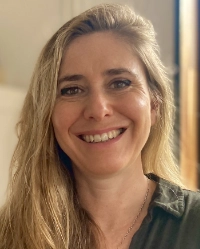 Cécilia Samieri is a research director at INSERM (France), specializing in the epidemiology of brain aging. She aims at understanding the role of environmental factors (the exposome) in the onset of age-related brain diseases such as Alzheimer's disease by analyzing large samples of population-based cohort studies.
Cécilia Samieri is a research director at INSERM (France), specializing in the epidemiology of brain aging. She aims at understanding the role of environmental factors (the exposome) in the onset of age-related brain diseases such as Alzheimer's disease by analyzing large samples of population-based cohort studies.
Veterinary by training, Cécilia Samieri turned to research and obtained a PhD in Epidemiology and Public Health from the University of Bordeaux, in 2009. At the Bordeaux Population Health research center, her work focuses on the link between the exposome (nutrition, chemical pollutants, the microbiota, etc.) and brain aging. She continued her work as a postdoctoral fellow at the Channing Division of Network Medicine (Harvard, Boston). On her return to the laboratory in 2012, she obtained a young researcher position with the support of the Alzheimer's Foundation before joining INSERM in 2015. She was promoted to Research Director in 2021.
She has recently set up a new cohort, the B cube study, to investigate the exposome of brain aging and dementia in early stages. The aim is to define early prevention strategies that could delay or avoid the disease and ultimately reduce the burden of AD on society.
 Cécilia Samieri is a research director at INSERM (France), specializing in the epidemiology of brain aging. She aims at understanding the role of environmental factors (the exposome) in the onset of age-related brain diseases such as Alzheimer's disease by analyzing large samples of population-based cohort studies.
Cécilia Samieri is a research director at INSERM (France), specializing in the epidemiology of brain aging. She aims at understanding the role of environmental factors (the exposome) in the onset of age-related brain diseases such as Alzheimer's disease by analyzing large samples of population-based cohort studies.
Veterinary by training, Cécilia Samieri turned to research and obtained a PhD in Epidemiology and Public Health from the University of Bordeaux, in 2009. At the Bordeaux Population Health research center, her work focuses on the link between the exposome (nutrition, chemical pollutants, the microbiota, etc.) and brain aging. She continued her work as a postdoctoral fellow at the Channing Division of Network Medicine (Harvard, Boston). On her return to the laboratory in 2012, she obtained a young researcher position with the support of the Alzheimer's Foundation before joining INSERM in 2015. She was promoted to Research Director in 2021.
She has recently set up a new cohort, the B cube study, to investigate the exposome of brain aging and dementia in early stages. The aim is to define early prevention strategies that could delay or avoid the disease and ultimately reduce the burden of AD on society.
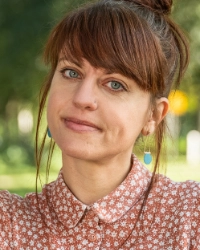 I studied Pharmacy at the Aristotle University of Thessaloniki, Greece, where I also did my PhD studying Transmissible Spongiform Encephalopathies. I then joined the lab of Bart De Strooper at KULeuven-VIB, Belgium, as a postdoctoral fellow to explore the role of microRNAs in Alzheimer’s disease. As a Staff Scientist in the lab of Bart De Strooper, I focused my research on the relevance of adult neurogenesis in the context of Alzheimer’s. In July 2020, I moved to the Netherlands to join the Netherlands Institute for Neuroscience as an independent Group Leader. My group studies the complex protein-coding and non-coding regulatory determinants of adult hippocampal neurogenesis in neurodegeneration. In our research, we employ single-cell omics, bioinformatics, animal models, postmortem human brain and (iPSC) cell cultures to explore brain repair and rejuvenation in aging, Alzheimer’s and cognitive resilience to dementia.
I studied Pharmacy at the Aristotle University of Thessaloniki, Greece, where I also did my PhD studying Transmissible Spongiform Encephalopathies. I then joined the lab of Bart De Strooper at KULeuven-VIB, Belgium, as a postdoctoral fellow to explore the role of microRNAs in Alzheimer’s disease. As a Staff Scientist in the lab of Bart De Strooper, I focused my research on the relevance of adult neurogenesis in the context of Alzheimer’s. In July 2020, I moved to the Netherlands to join the Netherlands Institute for Neuroscience as an independent Group Leader. My group studies the complex protein-coding and non-coding regulatory determinants of adult hippocampal neurogenesis in neurodegeneration. In our research, we employ single-cell omics, bioinformatics, animal models, postmortem human brain and (iPSC) cell cultures to explore brain repair and rejuvenation in aging, Alzheimer’s and cognitive resilience to dementia.
 I studied Pharmacy at the Aristotle University of Thessaloniki, Greece, where I also did my PhD studying Transmissible Spongiform Encephalopathies. I then joined the lab of Bart De Strooper at KULeuven-VIB, Belgium, as a postdoctoral fellow to explore the role of microRNAs in Alzheimer’s disease. As a Staff Scientist in the lab of Bart De Strooper, I focused my research on the relevance of adult neurogenesis in the context of Alzheimer’s. In July 2020, I moved to the Netherlands to join the Netherlands Institute for Neuroscience as an independent Group Leader. My group studies the complex protein-coding and non-coding regulatory determinants of adult hippocampal neurogenesis in neurodegeneration. In our research, we employ single-cell omics, bioinformatics, animal models, postmortem human brain and (iPSC) cell cultures to explore brain repair and rejuvenation in aging, Alzheimer’s and cognitive resilience to dementia.
I studied Pharmacy at the Aristotle University of Thessaloniki, Greece, where I also did my PhD studying Transmissible Spongiform Encephalopathies. I then joined the lab of Bart De Strooper at KULeuven-VIB, Belgium, as a postdoctoral fellow to explore the role of microRNAs in Alzheimer’s disease. As a Staff Scientist in the lab of Bart De Strooper, I focused my research on the relevance of adult neurogenesis in the context of Alzheimer’s. In July 2020, I moved to the Netherlands to join the Netherlands Institute for Neuroscience as an independent Group Leader. My group studies the complex protein-coding and non-coding regulatory determinants of adult hippocampal neurogenesis in neurodegeneration. In our research, we employ single-cell omics, bioinformatics, animal models, postmortem human brain and (iPSC) cell cultures to explore brain repair and rejuvenation in aging, Alzheimer’s and cognitive resilience to dementia.
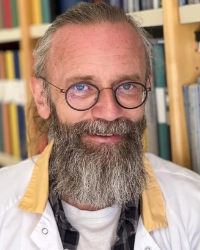 Henrik Zetterberg is a Professor of Neurochemistry at the University of Gothenburg, Sweden, and University College London, UK, and a Clinical Chemist at Sahlgrenska University Hospital in Gothenburg, Sweden. He is Head of the Department of Psychiatry and Neurochemistry at the University of Gothenburg, leads the UK DRI Fluid Biomarker Laboratory at UCL, and is a Key Member of the Hong Kong Center for Neurodegenerative Diseases and a Professor in the UW Department of Pathology and Laboratory Medicine, School of Medicine and Public Health, Madison, Wisconsin. His main research focus and clinical interest are fluid biomarkers for brain diseases, neurodegenerative diseases in particular.
Henrik Zetterberg is a Professor of Neurochemistry at the University of Gothenburg, Sweden, and University College London, UK, and a Clinical Chemist at Sahlgrenska University Hospital in Gothenburg, Sweden. He is Head of the Department of Psychiatry and Neurochemistry at the University of Gothenburg, leads the UK DRI Fluid Biomarker Laboratory at UCL, and is a Key Member of the Hong Kong Center for Neurodegenerative Diseases and a Professor in the UW Department of Pathology and Laboratory Medicine, School of Medicine and Public Health, Madison, Wisconsin. His main research focus and clinical interest are fluid biomarkers for brain diseases, neurodegenerative diseases in particular.
 Henrik Zetterberg is a Professor of Neurochemistry at the University of Gothenburg, Sweden, and University College London, UK, and a Clinical Chemist at Sahlgrenska University Hospital in Gothenburg, Sweden. He is Head of the Department of Psychiatry and Neurochemistry at the University of Gothenburg, leads the UK DRI Fluid Biomarker Laboratory at UCL, and is a Key Member of the Hong Kong Center for Neurodegenerative Diseases and a Professor in the UW Department of Pathology and Laboratory Medicine, School of Medicine and Public Health, Madison, Wisconsin. His main research focus and clinical interest are fluid biomarkers for brain diseases, neurodegenerative diseases in particular.
Henrik Zetterberg is a Professor of Neurochemistry at the University of Gothenburg, Sweden, and University College London, UK, and a Clinical Chemist at Sahlgrenska University Hospital in Gothenburg, Sweden. He is Head of the Department of Psychiatry and Neurochemistry at the University of Gothenburg, leads the UK DRI Fluid Biomarker Laboratory at UCL, and is a Key Member of the Hong Kong Center for Neurodegenerative Diseases and a Professor in the UW Department of Pathology and Laboratory Medicine, School of Medicine and Public Health, Madison, Wisconsin. His main research focus and clinical interest are fluid biomarkers for brain diseases, neurodegenerative diseases in particular.
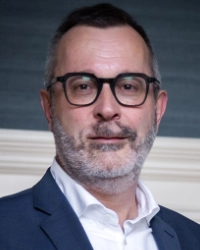 Bart Eggen received his MSc (1989) and PhD (1995) from the University of Utrecht. He obtained a Human Frontiers Science Program fellowship to work with Prof. Gail Mandel at the State University of New York and later with Prof. Ali Hemmati Brivanlou at the Rockefeller University in New York on the characterization of the transcriptional repressor protein REST/NRSF that controls neuron-specific gene expression. In 2000, he joined the Department of Developmental Genetics at the University of Groningen to work on the epigenetic regulation of embryonic stem cell pluripotency. In 2010, he moved to the UMCG where he is appointed as professor of molecular neurobiology, and currently serves as chair of the Dept. of Biomedical Sciences. His main research focus is on the (epi)genetic regulation of microglia identity and function in the context of the normal brain, during aging and under neuroinflammatory or neurodegenerative conditions such as multiple sclerosis and Alzheimer’s disease.
Bart Eggen received his MSc (1989) and PhD (1995) from the University of Utrecht. He obtained a Human Frontiers Science Program fellowship to work with Prof. Gail Mandel at the State University of New York and later with Prof. Ali Hemmati Brivanlou at the Rockefeller University in New York on the characterization of the transcriptional repressor protein REST/NRSF that controls neuron-specific gene expression. In 2000, he joined the Department of Developmental Genetics at the University of Groningen to work on the epigenetic regulation of embryonic stem cell pluripotency. In 2010, he moved to the UMCG where he is appointed as professor of molecular neurobiology, and currently serves as chair of the Dept. of Biomedical Sciences. His main research focus is on the (epi)genetic regulation of microglia identity and function in the context of the normal brain, during aging and under neuroinflammatory or neurodegenerative conditions such as multiple sclerosis and Alzheimer’s disease.
 Bart Eggen received his MSc (1989) and PhD (1995) from the University of Utrecht. He obtained a Human Frontiers Science Program fellowship to work with Prof. Gail Mandel at the State University of New York and later with Prof. Ali Hemmati Brivanlou at the Rockefeller University in New York on the characterization of the transcriptional repressor protein REST/NRSF that controls neuron-specific gene expression. In 2000, he joined the Department of Developmental Genetics at the University of Groningen to work on the epigenetic regulation of embryonic stem cell pluripotency. In 2010, he moved to the UMCG where he is appointed as professor of molecular neurobiology, and currently serves as chair of the Dept. of Biomedical Sciences. His main research focus is on the (epi)genetic regulation of microglia identity and function in the context of the normal brain, during aging and under neuroinflammatory or neurodegenerative conditions such as multiple sclerosis and Alzheimer’s disease.
Bart Eggen received his MSc (1989) and PhD (1995) from the University of Utrecht. He obtained a Human Frontiers Science Program fellowship to work with Prof. Gail Mandel at the State University of New York and later with Prof. Ali Hemmati Brivanlou at the Rockefeller University in New York on the characterization of the transcriptional repressor protein REST/NRSF that controls neuron-specific gene expression. In 2000, he joined the Department of Developmental Genetics at the University of Groningen to work on the epigenetic regulation of embryonic stem cell pluripotency. In 2010, he moved to the UMCG where he is appointed as professor of molecular neurobiology, and currently serves as chair of the Dept. of Biomedical Sciences. His main research focus is on the (epi)genetic regulation of microglia identity and function in the context of the normal brain, during aging and under neuroinflammatory or neurodegenerative conditions such as multiple sclerosis and Alzheimer’s disease.
 Dr. Róisín McManus completed her PhD at Trinity College Dublin under the joint supervision of Prof. Marina Lynch and Prof. Kingston Mills (2015) where she studied the effect of infection on the brain with age and Alzheimer’s disease (AD). Róisín then moved to Germany where she first worked with Prof. Dr. Michael Heneka (2015-2021) and then Prof. Dr. Eicke Latz (2021-2024) at the Institute of Innate Immunity, University of Bonn and the German Centre for Neurodegenerative diseases (DZNE),where she uncovered a new role for NLRP3 in the progression of AD and dementia.
Dr. Róisín McManus completed her PhD at Trinity College Dublin under the joint supervision of Prof. Marina Lynch and Prof. Kingston Mills (2015) where she studied the effect of infection on the brain with age and Alzheimer’s disease (AD). Róisín then moved to Germany where she first worked with Prof. Dr. Michael Heneka (2015-2021) and then Prof. Dr. Eicke Latz (2021-2024) at the Institute of Innate Immunity, University of Bonn and the German Centre for Neurodegenerative diseases (DZNE),where she uncovered a new role for NLRP3 in the progression of AD and dementia.
In 2024, Róisín was awarded a Fellowship from the DZNE to establish her own independent research group, ‘Translational Neuroimmunology’. The group make use of preclinical models and clinical samples to uncover how environmental factors like diet contribute to the progression of dementia. Róisín and her team are particularly interested in the role of chronic innate immune activation and metabolic signaling pathways in this process.
 Dr. Róisín McManus completed her PhD at Trinity College Dublin under the joint supervision of Prof. Marina Lynch and Prof. Kingston Mills (2015) where she studied the effect of infection on the brain with age and Alzheimer’s disease (AD). Róisín then moved to Germany where she first worked with Prof. Dr. Michael Heneka (2015-2021) and then Prof. Dr. Eicke Latz (2021-2024) at the Institute of Innate Immunity, University of Bonn and the German Centre for Neurodegenerative diseases (DZNE),where she uncovered a new role for NLRP3 in the progression of AD and dementia.
Dr. Róisín McManus completed her PhD at Trinity College Dublin under the joint supervision of Prof. Marina Lynch and Prof. Kingston Mills (2015) where she studied the effect of infection on the brain with age and Alzheimer’s disease (AD). Róisín then moved to Germany where she first worked with Prof. Dr. Michael Heneka (2015-2021) and then Prof. Dr. Eicke Latz (2021-2024) at the Institute of Innate Immunity, University of Bonn and the German Centre for Neurodegenerative diseases (DZNE),where she uncovered a new role for NLRP3 in the progression of AD and dementia.
In 2024, Róisín was awarded a Fellowship from the DZNE to establish her own independent research group, ‘Translational Neuroimmunology’. The group make use of preclinical models and clinical samples to uncover how environmental factors like diet contribute to the progression of dementia. Róisín and her team are particularly interested in the role of chronic innate immune activation and metabolic signaling pathways in this process.
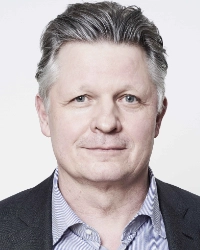 Frank Jessen received his MD degree from the University of Saarland in Germany in 1995 and was board certified as a psychiatrist and psychotherapist in 2002. From 2002-2014 he served as consultant psychiatrist and head of clinical Alzheimer’s disease research at the Department of Psychiatry, University of Bonn. In 2015, he was appointed as Professor of Psychiatry and Psychotherapy and director of the Department of Psychiatry, University of Cologne. Since 2010, he is an associate researcher and group leader for Clinical Alzheimer Research at the German Center of Neurodegenerative Diseases (DZNE). Since 2024 he is a member of the clinical executive board of the DZNE.
Frank Jessen received his MD degree from the University of Saarland in Germany in 1995 and was board certified as a psychiatrist and psychotherapist in 2002. From 2002-2014 he served as consultant psychiatrist and head of clinical Alzheimer’s disease research at the Department of Psychiatry, University of Bonn. In 2015, he was appointed as Professor of Psychiatry and Psychotherapy and director of the Department of Psychiatry, University of Cologne. Since 2010, he is an associate researcher and group leader for Clinical Alzheimer Research at the German Center of Neurodegenerative Diseases (DZNE). Since 2024 he is a member of the clinical executive board of the DZNE.
His research focusses on prevention, early diagnosis and treatment of Alzheimer’s disease with expertise in neuropsychology, neuroimaging, epidemiology and genetics. In this context, he coordinated national and international diagnostic multicenter studies and clinical trials.
He is a member of the board of the Germany Psychiatric Association (DGPPN), where he coordinates the national guideline on the diagnosis and treatment of dementia. He is the current chair of the European Alzheimer’s Disease Consortium (EADC) and the founder of the German Memory Clinic Network (DNG). He serves on several scientific advisory boards, including the German Alzheimer Association and Alzheimer Europe. Since 2025 he is a member of the World Dementia Council (WDC).
 Frank Jessen received his MD degree from the University of Saarland in Germany in 1995 and was board certified as a psychiatrist and psychotherapist in 2002. From 2002-2014 he served as consultant psychiatrist and head of clinical Alzheimer’s disease research at the Department of Psychiatry, University of Bonn. In 2015, he was appointed as Professor of Psychiatry and Psychotherapy and director of the Department of Psychiatry, University of Cologne. Since 2010, he is an associate researcher and group leader for Clinical Alzheimer Research at the German Center of Neurodegenerative Diseases (DZNE). Since 2024 he is a member of the clinical executive board of the DZNE.
Frank Jessen received his MD degree from the University of Saarland in Germany in 1995 and was board certified as a psychiatrist and psychotherapist in 2002. From 2002-2014 he served as consultant psychiatrist and head of clinical Alzheimer’s disease research at the Department of Psychiatry, University of Bonn. In 2015, he was appointed as Professor of Psychiatry and Psychotherapy and director of the Department of Psychiatry, University of Cologne. Since 2010, he is an associate researcher and group leader for Clinical Alzheimer Research at the German Center of Neurodegenerative Diseases (DZNE). Since 2024 he is a member of the clinical executive board of the DZNE.
His research focusses on prevention, early diagnosis and treatment of Alzheimer’s disease with expertise in neuropsychology, neuroimaging, epidemiology and genetics. In this context, he coordinated national and international diagnostic multicenter studies and clinical trials.
He is a member of the board of the Germany Psychiatric Association (DGPPN), where he coordinates the national guideline on the diagnosis and treatment of dementia. He is the current chair of the European Alzheimer’s Disease Consortium (EADC) and the founder of the German Memory Clinic Network (DNG). He serves on several scientific advisory boards, including the German Alzheimer Association and Alzheimer Europe. Since 2025 he is a member of the World Dementia Council (WDC).
 My journey into neuropathology began during my medical biology training, a passion that drove my academic career to become a Principal Investigator at Amsterdam UMC. There, my research group made significant discoveries regarding the fundamental causes of neurodegenerative diseases using human brain tissue from donors. In particular, we contributed to the knowledge on inflammation and the role of cellular stress mechanisms, such as the unfolded protein response (UPR), in Alzheimer's disease.
Beyond my research, I have actively contributed to the field as Editor-in-Chief of Acta Neuropathologica Communications and as an advisor for Alzheimer Nederland, fostering connections between foundational science and broader research communities.
My journey into neuropathology began during my medical biology training, a passion that drove my academic career to become a Principal Investigator at Amsterdam UMC. There, my research group made significant discoveries regarding the fundamental causes of neurodegenerative diseases using human brain tissue from donors. In particular, we contributed to the knowledge on inflammation and the role of cellular stress mechanisms, such as the unfolded protein response (UPR), in Alzheimer's disease.
Beyond my research, I have actively contributed to the field as Editor-in-Chief of Acta Neuropathologica Communications and as an advisor for Alzheimer Nederland, fostering connections between foundational science and broader research communities.
Recently, I transitioned from academia to industry, joining Roche in Basel. My current focus is on translating mechanistic insights from human neuropathology into practical applications, contributing to the development of new drugs for Alzheimer's patients.
 My journey into neuropathology began during my medical biology training, a passion that drove my academic career to become a Principal Investigator at Amsterdam UMC. There, my research group made significant discoveries regarding the fundamental causes of neurodegenerative diseases using human brain tissue from donors. In particular, we contributed to the knowledge on inflammation and the role of cellular stress mechanisms, such as the unfolded protein response (UPR), in Alzheimer's disease.
Beyond my research, I have actively contributed to the field as Editor-in-Chief of Acta Neuropathologica Communications and as an advisor for Alzheimer Nederland, fostering connections between foundational science and broader research communities.
My journey into neuropathology began during my medical biology training, a passion that drove my academic career to become a Principal Investigator at Amsterdam UMC. There, my research group made significant discoveries regarding the fundamental causes of neurodegenerative diseases using human brain tissue from donors. In particular, we contributed to the knowledge on inflammation and the role of cellular stress mechanisms, such as the unfolded protein response (UPR), in Alzheimer's disease.
Beyond my research, I have actively contributed to the field as Editor-in-Chief of Acta Neuropathologica Communications and as an advisor for Alzheimer Nederland, fostering connections between foundational science and broader research communities.
Recently, I transitioned from academia to industry, joining Roche in Basel. My current focus is on translating mechanistic insights from human neuropathology into practical applications, contributing to the development of new drugs for Alzheimer's patients.
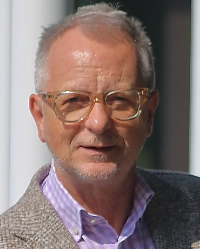 Christian Behl is Director of the Institute of Pathobiochemistry at the University-Medical-Center of the Johannes Gutenberg-University Mainz, Germany, where he is Full Professor and Chair since 2002. Behl holds a Diploma in Biology and his PhD from the University of Würzburg, Germany. Following his postdoc research on Alzheimer's Disease from 1992 to 1994 at the Salk Institute for Biological Studies, La Jolla, USA, he headed a Research Group on aging and neurodegeneration at the Max-Planck-Institute for Psychiatry in Munich from 1994-2002. In Mainz, Behl has translated his long-standing interest in neurodegeneration into a research focus on autophagy and proteostasis. One of his key research goals is to uncover molecular mechanisms that allow neurons to resist neurodegeneration. Behl is an advocate for widening the view on Alzheimer’s to improve understanding of this complex, age-related brain disorder. For 2023 and 2024 he was appointed to the committee of the National Academies of Sciences, Engineering, and Medicine (Washington D.C.) on „Research Priorities for Preventing and Treating Alzheimer’s Disease and Related Dementias”. Behl has received several awards, most recently the Science-Award 2025 of the Walter-and-Ilse-Rose-Foundation for his book on Alzheimer’s research (doi.org/10.1007/978-3-031-31570-1). He is a member of the Board of the German Alzheimer Foundation.
Christian Behl is Director of the Institute of Pathobiochemistry at the University-Medical-Center of the Johannes Gutenberg-University Mainz, Germany, where he is Full Professor and Chair since 2002. Behl holds a Diploma in Biology and his PhD from the University of Würzburg, Germany. Following his postdoc research on Alzheimer's Disease from 1992 to 1994 at the Salk Institute for Biological Studies, La Jolla, USA, he headed a Research Group on aging and neurodegeneration at the Max-Planck-Institute for Psychiatry in Munich from 1994-2002. In Mainz, Behl has translated his long-standing interest in neurodegeneration into a research focus on autophagy and proteostasis. One of his key research goals is to uncover molecular mechanisms that allow neurons to resist neurodegeneration. Behl is an advocate for widening the view on Alzheimer’s to improve understanding of this complex, age-related brain disorder. For 2023 and 2024 he was appointed to the committee of the National Academies of Sciences, Engineering, and Medicine (Washington D.C.) on „Research Priorities for Preventing and Treating Alzheimer’s Disease and Related Dementias”. Behl has received several awards, most recently the Science-Award 2025 of the Walter-and-Ilse-Rose-Foundation for his book on Alzheimer’s research (doi.org/10.1007/978-3-031-31570-1). He is a member of the Board of the German Alzheimer Foundation.
 Christian Behl is Director of the Institute of Pathobiochemistry at the University-Medical-Center of the Johannes Gutenberg-University Mainz, Germany, where he is Full Professor and Chair since 2002. Behl holds a Diploma in Biology and his PhD from the University of Würzburg, Germany. Following his postdoc research on Alzheimer's Disease from 1992 to 1994 at the Salk Institute for Biological Studies, La Jolla, USA, he headed a Research Group on aging and neurodegeneration at the Max-Planck-Institute for Psychiatry in Munich from 1994-2002. In Mainz, Behl has translated his long-standing interest in neurodegeneration into a research focus on autophagy and proteostasis. One of his key research goals is to uncover molecular mechanisms that allow neurons to resist neurodegeneration. Behl is an advocate for widening the view on Alzheimer’s to improve understanding of this complex, age-related brain disorder. For 2023 and 2024 he was appointed to the committee of the National Academies of Sciences, Engineering, and Medicine (Washington D.C.) on „Research Priorities for Preventing and Treating Alzheimer’s Disease and Related Dementias”. Behl has received several awards, most recently the Science-Award 2025 of the Walter-and-Ilse-Rose-Foundation for his book on Alzheimer’s research (doi.org/10.1007/978-3-031-31570-1). He is a member of the Board of the German Alzheimer Foundation.
Christian Behl is Director of the Institute of Pathobiochemistry at the University-Medical-Center of the Johannes Gutenberg-University Mainz, Germany, where he is Full Professor and Chair since 2002. Behl holds a Diploma in Biology and his PhD from the University of Würzburg, Germany. Following his postdoc research on Alzheimer's Disease from 1992 to 1994 at the Salk Institute for Biological Studies, La Jolla, USA, he headed a Research Group on aging and neurodegeneration at the Max-Planck-Institute for Psychiatry in Munich from 1994-2002. In Mainz, Behl has translated his long-standing interest in neurodegeneration into a research focus on autophagy and proteostasis. One of his key research goals is to uncover molecular mechanisms that allow neurons to resist neurodegeneration. Behl is an advocate for widening the view on Alzheimer’s to improve understanding of this complex, age-related brain disorder. For 2023 and 2024 he was appointed to the committee of the National Academies of Sciences, Engineering, and Medicine (Washington D.C.) on „Research Priorities for Preventing and Treating Alzheimer’s Disease and Related Dementias”. Behl has received several awards, most recently the Science-Award 2025 of the Walter-and-Ilse-Rose-Foundation for his book on Alzheimer’s research (doi.org/10.1007/978-3-031-31570-1). He is a member of the Board of the German Alzheimer Foundation.
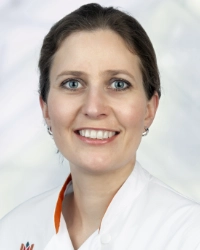 Dr. Elsmarieke van de Giessen is radiologist and nuclear medicine physician at Amsterdam UMC, Amsterdam, The Netherlands.
Dr. Elsmarieke van de Giessen is radiologist and nuclear medicine physician at Amsterdam UMC, Amsterdam, The Netherlands.
She completed medical school at the University of Amsterdam, followed by a PhD (cum laude) at Academic Medical Center in Amsterdam and a research fellowship on dopaminergic imaging in psychiatric disorders at Columbia University Medical Center, New York, United States. In 2020 she finished her radiology/nuclear medicine residency.
Currently she combines clinical work with research. Her research focus is on PET imaging in neurodegenerative disorders using various PET tracers for different target (amyloid, tau, synaptic density, neuroinflammation). She is leading a national consortium on the clinical value of tau PET imaging in the memory clinic and studies techniques to enhance brain delivery of novel medication for neurological diseases. She was a member of the EANM neuroimaging committee and serves in national and international guideline committees on dementia.
 Dr. Elsmarieke van de Giessen is radiologist and nuclear medicine physician at Amsterdam UMC, Amsterdam, The Netherlands.
Dr. Elsmarieke van de Giessen is radiologist and nuclear medicine physician at Amsterdam UMC, Amsterdam, The Netherlands.
She completed medical school at the University of Amsterdam, followed by a PhD (cum laude) at Academic Medical Center in Amsterdam and a research fellowship on dopaminergic imaging in psychiatric disorders at Columbia University Medical Center, New York, United States. In 2020 she finished her radiology/nuclear medicine residency.
Currently she combines clinical work with research. Her research focus is on PET imaging in neurodegenerative disorders using various PET tracers for different target (amyloid, tau, synaptic density, neuroinflammation). She is leading a national consortium on the clinical value of tau PET imaging in the memory clinic and studies techniques to enhance brain delivery of novel medication for neurological diseases. She was a member of the EANM neuroimaging committee and serves in national and international guideline committees on dementia.
 Stefan Bläsi, PhD, earned his doctorate in neuropsychology from the University of Basel. With over 20 years of experience as a clinical neuropsychologist in memory clinics, he currently works at University Geriatric Medicine Felix Platter and the University Hospital in Basel. Since 2016, he has been a lecturer in neuropsychology at the Zurich University of Applied Sciences (ZHAW). His professional focus includes early detection and differential diagnosis of typical and atypical clinical syndromes in neurodegenerative diseases, cognitive deficits in multiple sclerosis, and perioperative cognitive monitoring during awake glioma surgery.
Stefan Bläsi, PhD, earned his doctorate in neuropsychology from the University of Basel. With over 20 years of experience as a clinical neuropsychologist in memory clinics, he currently works at University Geriatric Medicine Felix Platter and the University Hospital in Basel. Since 2016, he has been a lecturer in neuropsychology at the Zurich University of Applied Sciences (ZHAW). His professional focus includes early detection and differential diagnosis of typical and atypical clinical syndromes in neurodegenerative diseases, cognitive deficits in multiple sclerosis, and perioperative cognitive monitoring during awake glioma surgery.
 Stefan Bläsi, PhD, earned his doctorate in neuropsychology from the University of Basel. With over 20 years of experience as a clinical neuropsychologist in memory clinics, he currently works at University Geriatric Medicine Felix Platter and the University Hospital in Basel. Since 2016, he has been a lecturer in neuropsychology at the Zurich University of Applied Sciences (ZHAW). His professional focus includes early detection and differential diagnosis of typical and atypical clinical syndromes in neurodegenerative diseases, cognitive deficits in multiple sclerosis, and perioperative cognitive monitoring during awake glioma surgery.
Stefan Bläsi, PhD, earned his doctorate in neuropsychology from the University of Basel. With over 20 years of experience as a clinical neuropsychologist in memory clinics, he currently works at University Geriatric Medicine Felix Platter and the University Hospital in Basel. Since 2016, he has been a lecturer in neuropsychology at the Zurich University of Applied Sciences (ZHAW). His professional focus includes early detection and differential diagnosis of typical and atypical clinical syndromes in neurodegenerative diseases, cognitive deficits in multiple sclerosis, and perioperative cognitive monitoring during awake glioma surgery.